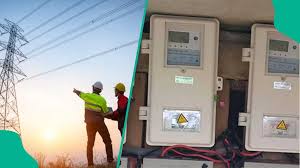The Federal Government has said it will begin the full rollout of free electricity meters under the Presidential Metering Initiative (PMI) by the fourth quarter of 2025. This move is part of efforts to close Nigeria’s huge metering gap and improve operations in the power sector.
Speaking during the second day of the Nigerian Electricity Supply Industry (NESI) Stakeholders Meeting held on Tuesday in Lagos, a representative of the Special Adviser to the President on Energy, Eriye Onagoruwa, gave updates on the initiative. She said that the PMI is aimed at delivering more than six million free electricity meters to Nigerians.
According to her, the funding for these meters will come from different sources such as the Distribution Sector Recovery Programme (DISREP), the Federation Account, and the Meter Asset Fund. She explained that the initiative will begin with Band A customers, who are the highest electricity consumers and are supposed to get at least 20 hours of power supply daily.
Onagoruwa said the success of the programme depends on improving the process for certifying installers, strengthening communication infrastructure, and ensuring all parties involved are fully ready to implement the plan. This includes coordination with the Bureau of Public Enterprises (BPE), the National Power Training Institute of Nigeria (NAPTIN), and the electricity distribution companies (Discos).
The Nigerian Electricity Regulatory Commission (NERC) confirmed the plan in a post on its official X (formerly Twitter) handle, noting that the deployment strategy would focus on high-consumption areas before spreading to other customer categories.
Onagoruwa said, “Full rollout is targeted for Q4 2025, with ongoing coordination among DisCos, BPE, and NAPTIN to ensure implementation readiness.”
Metering has remained one of the biggest challenges in Nigeria’s power sector. Millions of electricity consumers across the country still depend on estimated billing, where they are charged without a clear reading of their electricity usage. This system has caused several complaints from customers who say they are being unfairly charged for power they did not consume.
The PMI was introduced in 2023 by President Bola Tinubu’s administration as part of broader power sector reforms. The idea is to improve fairness in billing, increase transparency, and help Discos collect revenue more efficiently.
Earlier in 2025, the Minister of Power, Chief Adebayo Adelabu, said the government was expecting around 75,000 meters under the first phase of the International Competitive Bid (ICB 1) by April. Another 200,000 meters are also expected under the second batch in May 2025.
During the NESI Stakeholders Meeting, other key discussions focused on the transition of Nigeria’s electricity sector to allow states to manage their own power markets. This is in line with the Electricity Act of 2023, which gives state governments the authority to regulate electricity within their boundaries.
So far, 11 states have started the transition, while seven states — Enugu, Ondo, Ekiti, Imo, Oyo, Edo, and Kogi — have fully taken over the regulation of electricity in their areas.
Stakeholders at the meeting highlighted the importance of building capacity among workers, attracting investments, and ensuring proper coordination between state and federal regulators to make the new system work effectively. They also stressed the need to harmonise regulations, improve electricity supply, and expand grid access across the country.
The NESI Stakeholders Meeting is seen as a vital forum where government officials, regulators, electricity companies, technical partners, and other key players in the industry come together to review the progress made and chart a better path forward for Nigeria’s electricity sector.
As Nigeria continues its journey toward a more decentralised and efficient power industry, efforts such as the Presidential Metering Initiative and the Electricity Act 2023 are seen as crucial steps in solving some of the country’s long-standing electricity problems. With proper coordination and full implementation, government officials say these efforts will help reduce estimated billing, restore trust between Discos and consumers, and improve the overall experience of electricity users across the country.
